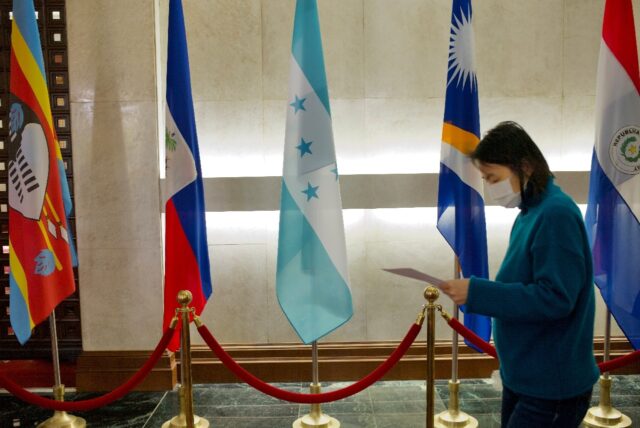Honduras has decided to switch diplomatic recognition from Taiwan to China, describing it as an economic necessity.
If completed, that means Taiwan would be recognised by just 13 nations, marking the latest victory in Beijing’s long-running campaign to isolate the island on the world stage.
Why does recognition matter to Beijing?
At the end of the Chinese Civil War in 1949, Mao Zedong’s communist forces successfully pushed out Chiang Kai-shek’s Nationalists, who relocated to Taiwan.
The island has been self-ruled since, but Beijing considers it a part of its territory, to be taken one day, by force if necessary.
China also bristles at any attempt to treat the island as an independent nation-state. Under its “One China” principle, no country may maintain official diplomatic relations with both China and Taiwan.
Taiwan maintains a similar policy, cutting ties with countries that recognise Beijing over Taipei.
Why has pressure grown on Taiwan?
During the eight years in which Beijing-friendly Ma Ying-jeou was president of Taiwan, the island lost diplomatic recognition from just one country.
But relations plunged in 2016 with the election of his successor Tsai Ing-wen.
She enraged China by espousing a position that Taiwan is an “already independent” sovereign nation that is not subordinate to Beijing.
China has since ramped up diplomatic and military pressure on the island, with eight nations ditching Taipei to recognise Beijing. Honduras would be the ninth.
How has China wooed Taiwan’s allies?
China has used economic leverage to poach several of Taiwan’s erstwhile allies in recent years, especially in Latin America.
The imminent switch by Honduras came weeks after the Latin American nation’s government announced it was negotiating with China to build a major hydroelectric dam.
What China offers countries is, however, much more than just infrastructure investment, analysts say.
“China represents one of the largest markets in the world and it is growing and expanding,” said Henry Rodriguez, head of the economics department at the National Autonomous University of Honduras.
“Taiwan has been a partner to Honduras for many years, they supported us, but people say the support they give us is not very significant because it is capped at $50 million a year and that China will be able to give us more support.”
Does Taiwan have any powerful friends?
Despite switching diplomatic recognition to Beijing in 1979, Washington remains Taiwan’s main ally.
The United States has pursued a policy where it “acknowledges” China’s claim to the island, which is not the same as accepting Beijing’s claim of sovereignty over Taiwan.
It opposes both Taiwanese independence and any attempt by China to forcibly take the island. It also maintains trade ties with Taiwan and is its biggest arms supplier.
Taiwan also has deep trade links with Europe and other parts of the world, thanks in particular to its dominance in the production of semiconductors, whose supply is critical to the global economy.
And the United States may step in to help stop Honduras from going through with its switch to Beijing, analysts said.
“Washington has long considered Central America within its sphere of influence and is loath to welcome any additional Chinese influence in the region,” said Gary Sands, a former US diplomat and analyst at geostrategic consultancy Wikistrat.
“So to some extent, the US, as Honduras’s most important economic partner, could provide economic incentives to Tegucigalpa and/or apply diplomatic pressure.”
How does loss of recognition impact Taiwan?
Despite the dwindling pool of nations that recognise it, Taiwan would not be considered internationally isolated even if that number fell to zero, said analysts.
“Strong, multifaceted ties with influential economies and democracies are better at solidifying Taiwan’s international presence than official ties with relatively small states,” said J. Michael Cole, a Taipei-based adviser at the International Republican Institute.
“The officials and NGOs in Taiwan have been very active in managing relationships with international partners through non-official channels,” said Lo Li-chia, a political analyst at the University of Canberra.
“This part would not go away even if Taiwan has zero international recognition.”

COMMENTS
Please let us know if you're having issues with commenting.